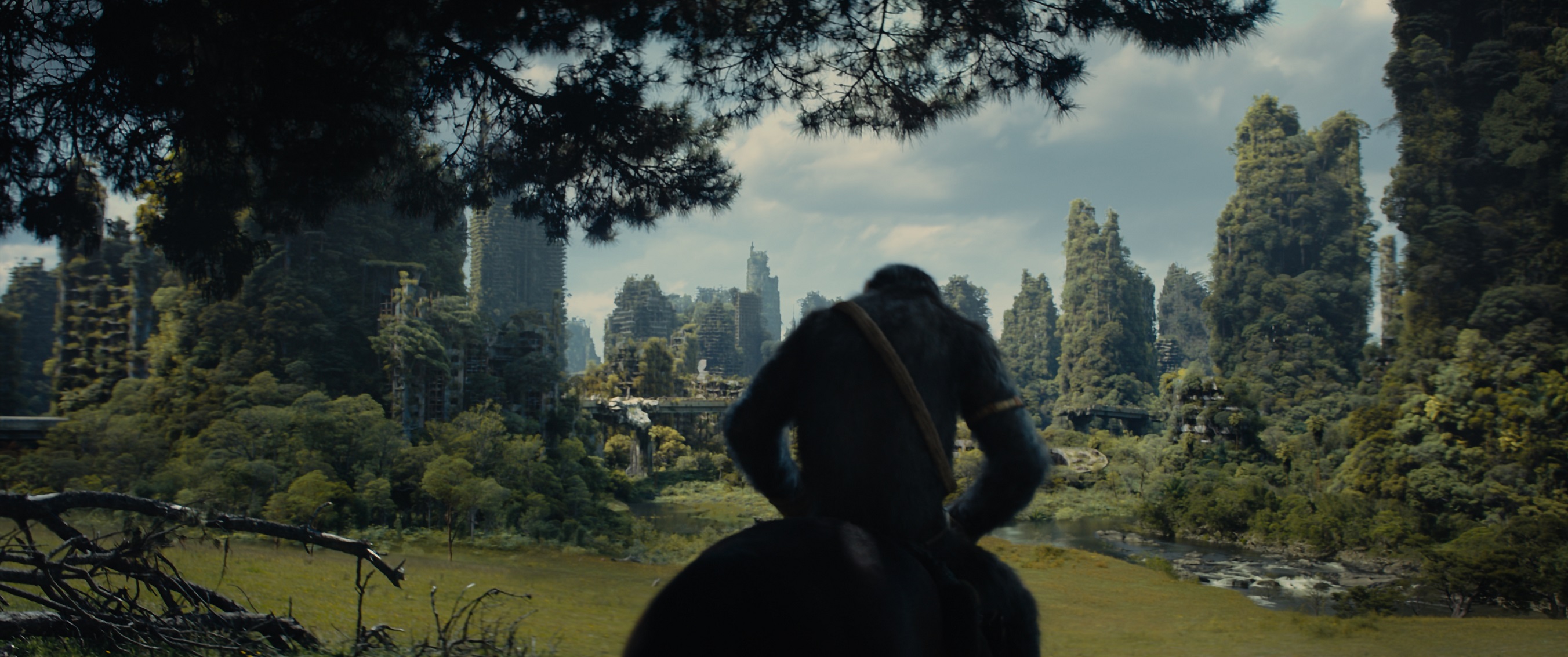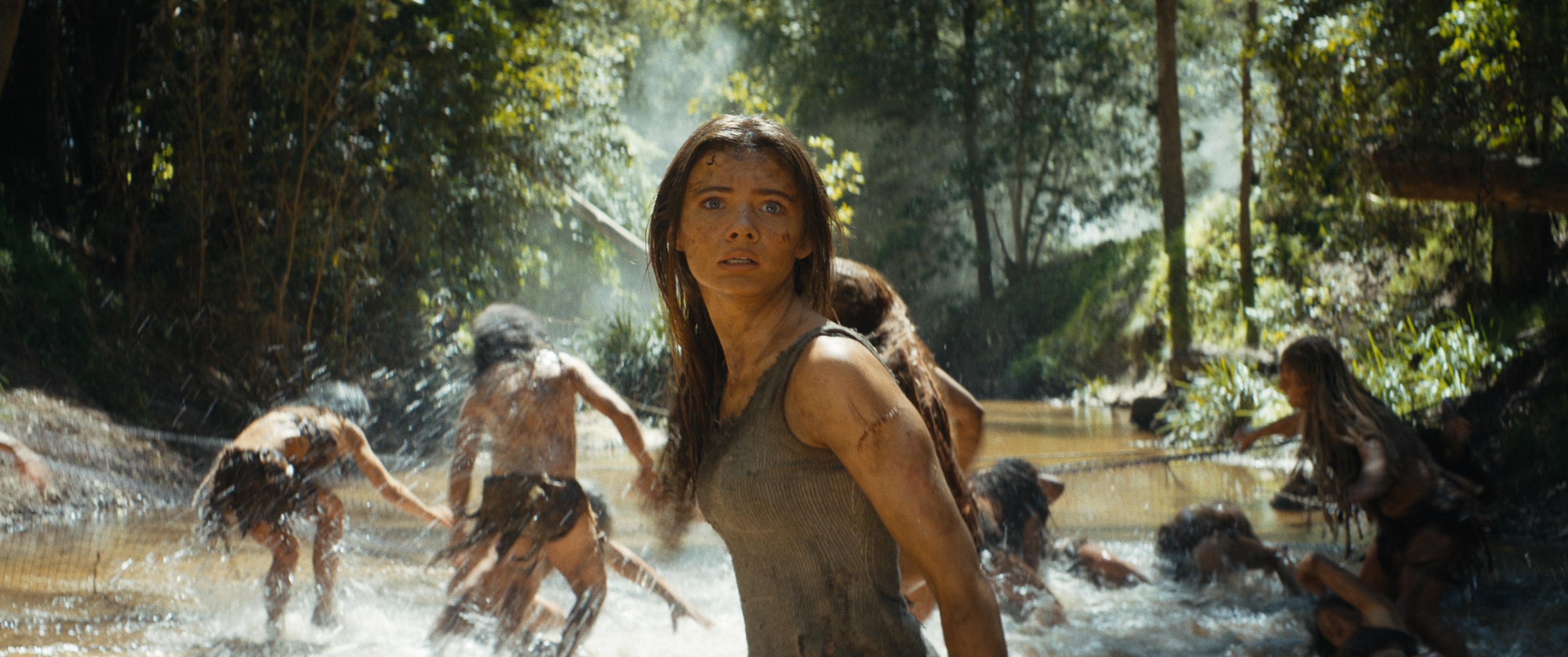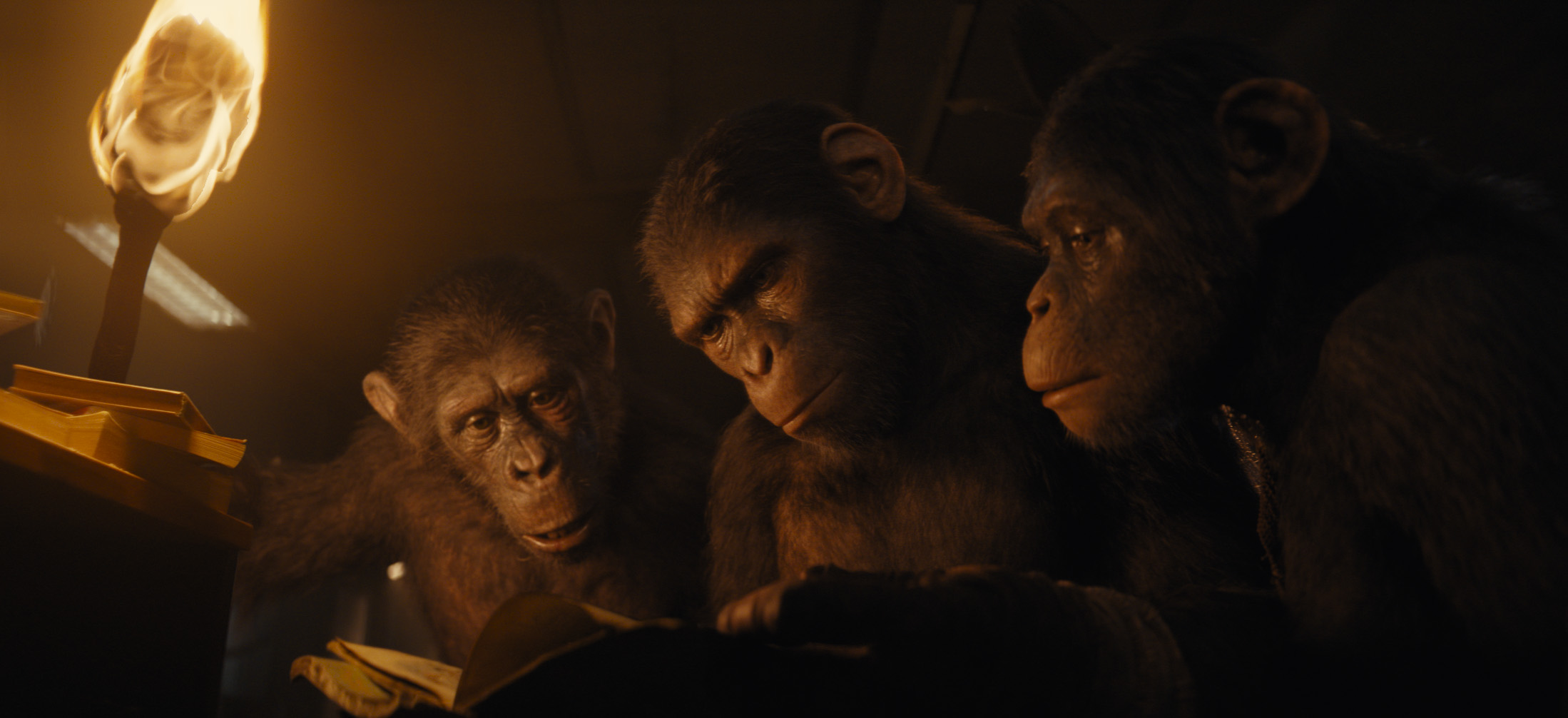Planet of the Apes is the most artfully replenished franchise, from the original series’ elegant time-travel loop to the reboot’s rich, deepening milieu. Director Wes Ball again offers serious sf, just as much as Dune, considering the consequences of another species’ dominance, and outraged humanity’s resistance.
We are unspecified centuries after Matt Reeves’ War for the Planet of the Apes (2017), with Caesar’s reign now a font of vaguely remembered ape faith. Human civilisation – and its weaponry – has fallen away, leaving a green world, with mysterious skyscraper skylines sheathed in foliage, and meaningless metal girders in the undergrowth: roads to nowhere. It is an Eden, a post-human, post-climate change jungle paradise for chimps such as Noa (Owen Teague), naïve young prince of the Eagle clan.
For 50 minutes, Ball and screenwriter Josh Friedman leave us in this exclusively ape, alien world, as performance-capture AI and CGI fill its agrarian society, where sign-language and animal grunts are the atavistic deep speech beneath human words. The Eagle clan is not the world, though, and a gorilla raiding party devastates them and seizes the survivors, leading Noa on a picaresque odyssey in pursuit, piecing together the buried past as he goes, from wise orangutan Oban (Peter Raka), keeper of the true, noble Caesar message, and a female human (Freya Allan, pictured below) who, unlike her dumb, verminous compatriots, can speak.
The Eagle clan is not the world, though, and a gorilla raiding party devastates them and seizes the survivors, leading Noa on a picaresque odyssey in pursuit, piecing together the buried past as he goes, from wise orangutan Oban (Peter Raka), keeper of the true, noble Caesar message, and a female human (Freya Allan, pictured below) who, unlike her dumb, verminous compatriots, can speak.
Where Rise of the Planet of the Apes (2011) remade civil rights/race riot allegory Conquest of the Planet of the Apes (1972), Ball’s era-jump takes us closer, perhaps, to the 1968 original. The female human is at first called Nova, like the companion Taylor (Charlton Heston) took. “We call them all Nova,” Noa contemptuously explains. Mounted gorillas netting human prey in a river replays the apes’ explosive ’68 introduction, though the shocking novelty, full-blooded action and jagged avant-garde score and framing of Franklin J Schaffner’s film leaves Ball flaccid by comparison. As Noa and Nova ride along a coastal strip of beach, you expect the Statue of Liberty around the next turn. Whether fan-service or a deeper game, when apes and humans later peer into seemingly portent-filled outer space, they could be watching the skies for Taylor’s NASA ship. POTA 2.0’s hard reboot from atomic apocalypse and time-travel to pandemic catastrophe make this unlikely. But perhaps we are moving towards that era of Forbidden Zone shibboleths on apes’ inferior past, and their regrown, medieval world.
As Noa and Nova ride along a coastal strip of beach, you expect the Statue of Liberty around the next turn. Whether fan-service or a deeper game, when apes and humans later peer into seemingly portent-filled outer space, they could be watching the skies for Taylor’s NASA ship. POTA 2.0’s hard reboot from atomic apocalypse and time-travel to pandemic catastrophe make this unlikely. But perhaps we are moving towards that era of Forbidden Zone shibboleths on apes’ inferior past, and their regrown, medieval world.
This coast is anyway home to the fledgling empire of Proximus Caesar (Kevin Durand), based in a rusting red hulk of a ship, with captured clans as slave labour to haul down the great gates of a vast human vault, surely stuffed with treasure to super-charge ape evolution. Proximus’s admiring knowledge of human power comes from tame quisling Trevathan (William H. Macy). With his comfortable bourgeois study and tattered Vonnegut books, this ageing hippie reads Roman history to the new Caesar at night.
Proximus’s vision at times outweighs his cruelty, and Noa would do well to heed one piece of his advice: “You can’t trust humans.” Leafing through an ancient picture book and seeing his kind in cages is horrifying enough. Nova, real name Mae, is also revealed as a ruthless woman with a cause. “You can’t have it,” she says with profound petulance, when the vault’s store of brutal human achievement is breached. Questions of acquiescence and resistance, cultural subjugation and survival fill Friedman’s script, and in this Eden Mae is more Satan than Eve. She exemplifies the truth of Richard Matheson’s radical 1954 horror novel I Am Legend (best-filmed in another Heston sf epic, The Omega Man), where in a vampirised society, the last, vampire-hunting human is the monster.
Questions of acquiescence and resistance, cultural subjugation and survival fill Friedman’s script, and in this Eden Mae is more Satan than Eve. She exemplifies the truth of Richard Matheson’s radical 1954 horror novel I Am Legend (best-filmed in another Heston sf epic, The Omega Man), where in a vampirised society, the last, vampire-hunting human is the monster.
We are living in a world we’re devastating, among the bones of the species we’ve destroyed. Ball’s green planet of the apes is an improvement, rightly fearing human reclamation. The ideas at play since Pierre Boule’s original, 1963 novel Monkey Planet are eternally rich.















Add comment